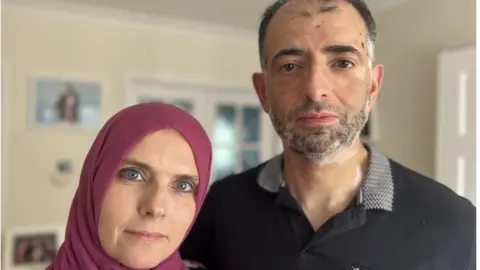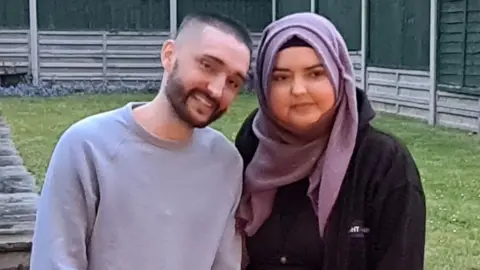Luton cancer campaigners want £40m promised by government
 BBC
BBCThe parents of a young woman who died after she developed a brain tumour said they wanted the government to fulfil a pledge to spend £40m on research.
Yasmin Stannard and Khuram Liaquat, from Luton, said they did not know why most of the money - due to be allocated over five years - had not been spent.
Their daughter Amani raised £37,000 for Brain Tumour Research before she died.
A Department of Health and Social Care spokesperson said it had "invested in every suitable application made".
The couple are due to attend an All-Party Parliamentary Group that will discuss brain tumours and how the government allocates funding for research.
Amani Liaquat found out she had an aggressive brain tumour called glioblastoma multiforme on her 22nd birthday in April 2020.
Following her diagnosis, she raised tens of thousands of pounds for charity and spoke about the need for brain tumour research and more funding.
She recorded 10 episodes of a podcast, Chat2Amani, about the condition, which featured The Wanted's Tom Parker as a guest.
Mr Liaquat described his eldest daughter as "the light of our family". She died in February 2022.
 Family Photo
Family PhotoBuckinghamshire-based charity Brain Tumour Research said only 1% of the national spend on cancer research had been allocated to the disease since records began in 2002.
Hugh Adams, from the charity, said the lack of funding was slowing down advancement of treatment.
"Somebody diagnosed today has got no better chance than somebody five to 10 years ago," he said.
In 2018, the government pledged £40m over five years in honour of Dame Tessa Jowell, who died from brain cancer that year.
But the latest government figure showed only £10.7m had been spent so far.
 Family Photo
Family PhotoMs Stannard said the lack of funding for brain cancer research in the UK was "woefully inadequate", with other countries "significantly further ahead".
Mr Liaquat said: "There's a number of exceptional potential trials which if funded could make a significant difference to other families' lives.
"I think the whole system has to be reviewed as to how they allocate the funding, because I think a lot of applications are being declined, probably unfairly, and people feel like they're hitting a brick wall."
A Department of Health and Social Care spokesperson said: "To encourage further successful applications, we are investing in infrastructure, workshops for researchers and training for clinicians."

Follow East of England news on Facebook, Instagram and Twitter. Got a story? Email [email protected] or WhatsApp us on 0800 169 1830
